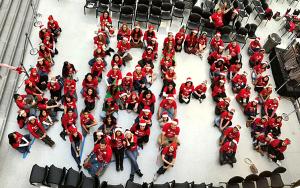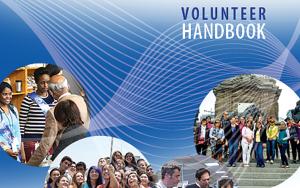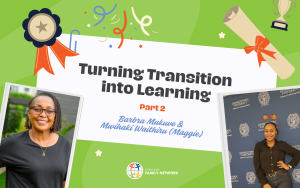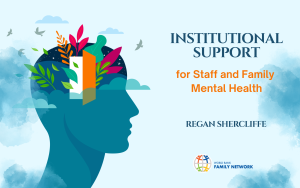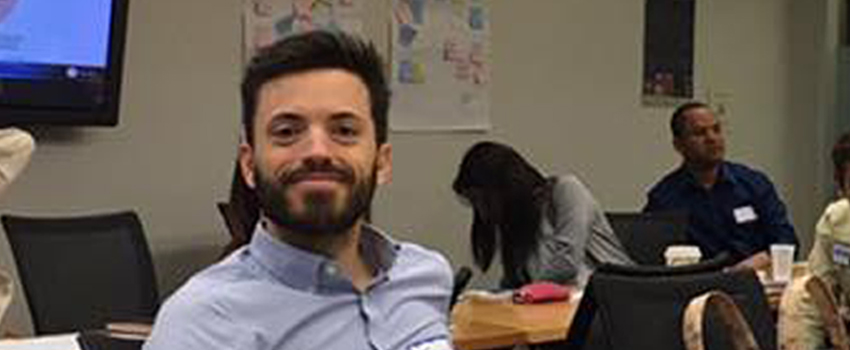
Julien is a WBG spouse who recently relocated to Washington DC. Below, he describes how he handled his professional goals before and after relocation, and the thing he has learned in the process.
A bit of background on my relocation:
- My wife and I both wanted to live abroad again after a first experience about ten years ago
- My wife was already working on a temporary contract in Washington DC. Still undecided, I started applying to jobs there (in development and in the private sector) from our home country.
- My wife was then offered a staff position at WB, which made the decision to move easier. I quit my job and prepared for relocation (selling the house, packing, etc., etc.).
- My intention was to work as soon as possible after relocation. I knew what I wanted to do in DC—I am not a risk-taker or was not in a “reinvent myself” mindset.
Here’s what my relocation experience looks like as a line graph. The line represents how things were going for me:
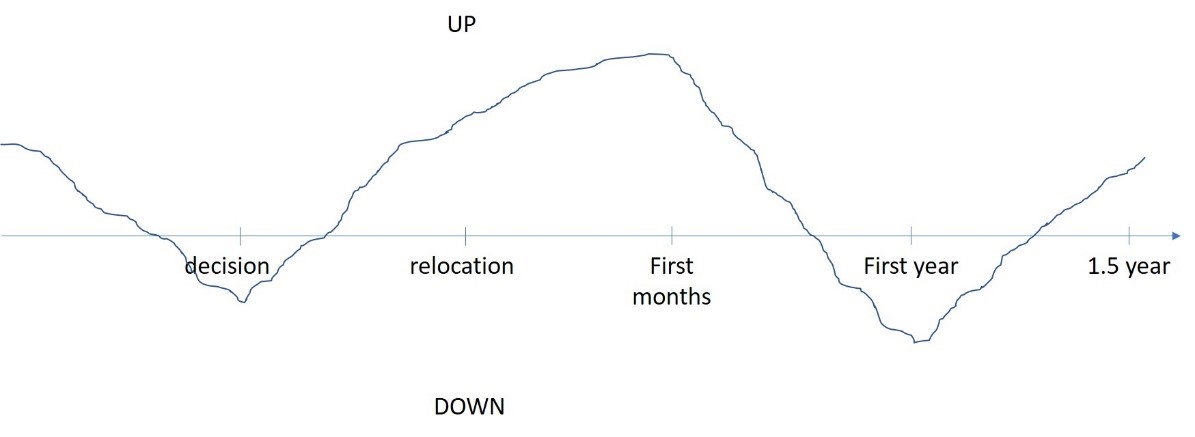
The ups and downs:
Before quitting my job and relocating to DC, I was already faced with a dilemma because my plan had been to find a job first, before making the decision to relocate. As I said I’m rather risk-averse and I feared moving without having a plan in place. However, the more time passed the less probable it looked that I would find a job from abroad. I applied to a lot of postings but got no job interviews. So, I had to accept this fact, and take the risk, i.e. accept relocating without a safety net—literally jump into the unknown.
After we made all these decisions (December 2016) and until my relocation (June 2017), I became very eager and excited about moving forward, taking risks (after all!), changing my life, and meeting new people. Even though leaving friends and family was sad and emotional, my excitement overcame my reservations.
After relocating and for the first few months (end of 2017, beginning of 2018), I was still excited about meeting new people, and enjoying my new life in DC. Plus, at the beginning, you have so many things to do, e.g. paperwork (social security, work permit, driver’s license, etc.), which keeps you busy. Of course, after a geographic split, my wife and I were also happy to be together again.
Professionally speaking, I was in a learning phase. I think that the WBFN Career Lab was a game changer for me. It helped me to understand how to craft a better resume and better cover letter, as well as prepare for job interviews—in other words, learning how to adapt to the local job market.
I got my work permit relatively quickly, and managed to land two consultancies for two different multilateral development banks (MDBs). Even though they were short-term, I was very optimistic about the future and grateful to have my first job experience in DC.
The end of these consultancies coincided with the birth of our daughter. At that time, I was applying for jobs in MDBs as well as in the private sector and my first job interviews were encouraging—a shout-out here to WBFN Career Lab! I also wanted to spend time with my newborn and my wife, so I cooled off my professional activities for a while. Retrospectively, I think I should not have stopped networking.
When I felt ready to resume, I learned that I had not been selected for the two jobs I had put a lot of hopes in. So, I had to start again, waiting for the relevant job offer, and networking to chase new consultancies. Unfortunately, during the summer time, basically just before the end of the fiscal year and until end of august, nothing really moves in MDBs, so I was in the situation where I did not have any opportunity for a while.
At this point, I started to lose self-confidence and to have serious doubts about whether we should stay after the end of my wife’s contract. We decided to reexamine our options after the summer (September 2018), since my wife’s contract was to end at the beginning of 2019.
After the summer many things moved forward at the same time. My wife was offered a three-year renewal of her contract, and I landed three different consultancies. Even though one full-time job would probably have been more comfortable, all this gave me sufficient visibility for one year to be optimistic and so we decided to stay.
Some things I learned, and think are important to share:
- Be a team with your spouse. Relocating puts you out your comfort zone—quitting your job, living away from your social network, having to create a new professional network, etc. Doubts and tension can follow. It is paramount that the relocation decision be taken by the couple as a team. In-depth communication is necessary to anticipate what can go wrong, establish safeguards (e.g. setting a future date to reevaluate the situation), or just communicate how you feel when you (or your spouse) is having doubts.
- Have a project. This can be any project, like having a break because you worked intensively for the past years, changing your career, getting another academic degree or looking for a job matching your current skillset. If you have a project, you’ll have a clear direction and structure for how to spend and organize your time. You’ll be able to easily explain what you are doing and what you want to achieve to your new social network or your friends and family back home. This is important because sometimes without necessarily meaning harm, people can sometimes lack empathy. Rather than listening to you and helping you, they imagine themselves in your situation and express their own doubts or fear. Having a plan also enables you to handle those vulnerable moments when you are asking yourself what you are doing with your life as a “trailing” spouse.
- Self-confidence is something easily lost. Being out of your comfort zone can be psychologically hard, and things might not work as you planned or as quickly as you expected. In these situations, it is very easy to compare yourself to your spouse enjoying her new job at WB (going on exciting missions) or to your friends back home who are progressing in their careers, or having a great time without you. It is very human to do this and may lead you to lose your self-confidence quickly. By relocating and going out of your comfort zone, you take a risk and are braver than many people (how many times have I heard, “I couldn’t do what you’re doing”?). In the end, the reward is great, and you learn a lot about yourself. Personally, I feel more resilient and I realize every day what I have gained by relocating.
- Be prepared to step down professionally. If your plan is to find a job ASAP after relocation and if it’s your first time abroad and you have no professional network, you’ll need to have realistic expectations. It is better to have a first experience not as “seasoned” as your previous job or with lower benefits, than no experience at all. You will be able to “sell” your first experience later. And we should not forget that our spouses have generally good benefits being staff at WB, so it is less urgent to have good benefits for yourself.
- Be patient and self-indulgent. A lot of people who have relocated in DC will tell you the same thing—it takes at least a year to adapt to the local job market and find your own opportunities. That is simply a fact, but in the end, with dedication things happen. So, don’t be too harsh on yourself—you’re not failing if you don’t land your dream job within the first six months.

